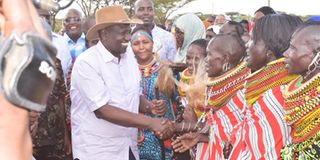State to build two new dams to tackle food shortage in drought-hit Samburu

President William Ruto is welcomed by Samburu women in Baragoi stadium on November 5, 2022. The head of state announced his administration will build two new dams to tackle food security in the drought-hit region
The government wants to build another two dams in Samburu in a bid to improve water security for thousands of nomadic pastoralists in the region that is prone to alternating natural calamities brought by extreme weather events.
President William Ruto said the dams will be used to collect and conserve water for use in homes during dry seasons. He also said the dams will aid in irrigation as part of his government’s plans to end the cycle of hunger and dependency on rain-fed agro-pastoralism.
Speaking in Baragoi on Saturday, Dr Ruto underscored the need to conserve the environment so as to mitigate climate change that he said could worsen food insecurity.
"To avert situations like this, we should start water harvesting. We have identified about 100 dams we are going to build across the country, including two here in Samburu," the President said.
President Ruto, who called the ongoing drought the worst in four decades, also said farmers will be supported to access quality subsidised inputs such as seeds, fertiliser and pesticides. Farmers will also have access to extension services in order to improve farming skills.
"We are experiencing a shortage of maize and other farm produce because farmers could not afford farm inputs, but we have already subsidised them (farm inputs). We will work with local research institutions to scale up seed multiplication for all crops,” he said.
He said the government will import maize to plug a production deficit. He added that his administration is working with development partners to alleviate hunger caused by ongoing dry spells.
"I know people are really suffering because of hunger and drought. We are here in partnership with development partners to cushion struggling pastoralists. We are working together to make sure that relief food reaches every part of the county," he said.
He continued: "We are going to import some bags for now because we have a shortage, but starting next year we produce ours in plenty."
Dr Ruto described the current drought as the worst in four decades and called for concerted efforts to address it.
A severe drought ravaging the semi-arid region has threatened the livelihoods of nomadic pastoralists, with massive livestock deaths amid lack of water and pastures. Governor Jonathan Lelelit said Samburu is enduring one of the harshest droughts in a long time and locals face a humanitarian crisis.
A large percentage of locals practise pastoralism and depend on livestock for all their basic needs, and livestock deaths as a result of the drought have undermined their economic and food security.
He wants the national government and other partners to buy surviving cattle at reasonable prices so as to cushion pastoralists against losing their livelihoods.
Most Samburu residents, for instance, sell their animals to pay school fees and buy foodstuffs. The value of livestock has deteriorated and livestock markets have collapsed.
Livestock market prices continue to decline across pastoralist zones due to a deterioration in their body conditions, with major water sources in the area drying up, says the National Drought Management Authority (MDMA).
Governor Lelelit said the drought is worsening due to inadequate short rains, urging the government to start another animal off-take programme.
He said the destocking will help remove the affected animals before they become emaciated, lose their value, die or pose a risk to public health. He added that the programme will enable pastoralists to salvage some capital from their livestock at risk and support families with cash to meet their food needs and other basic necessities.





